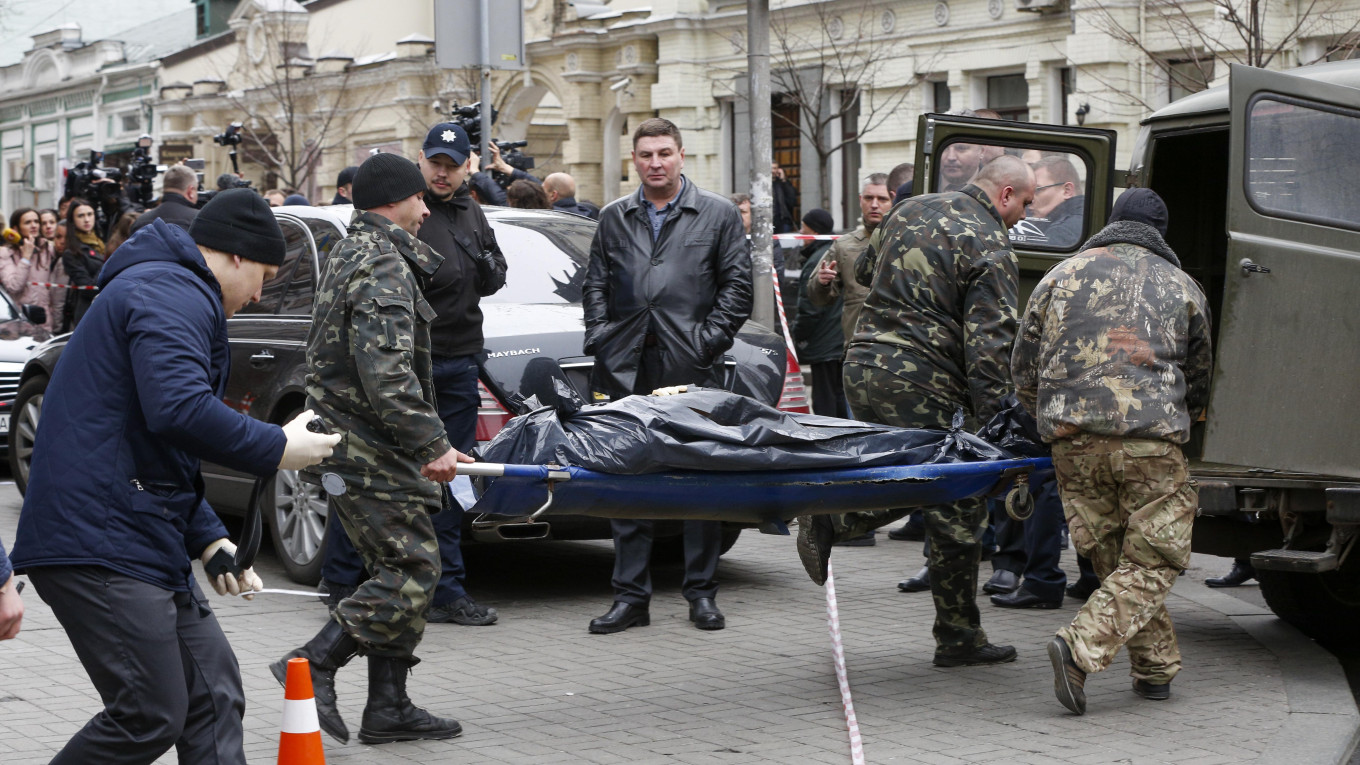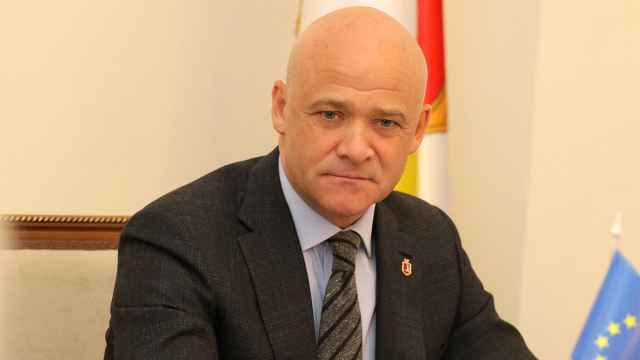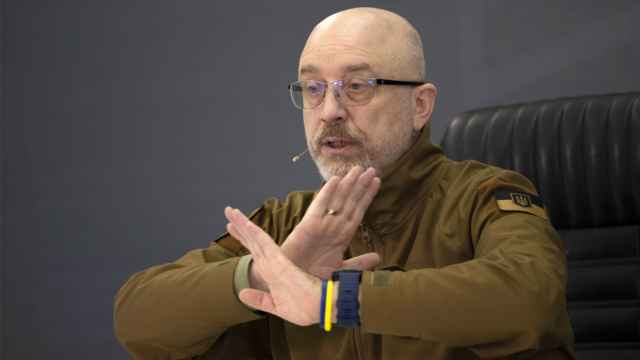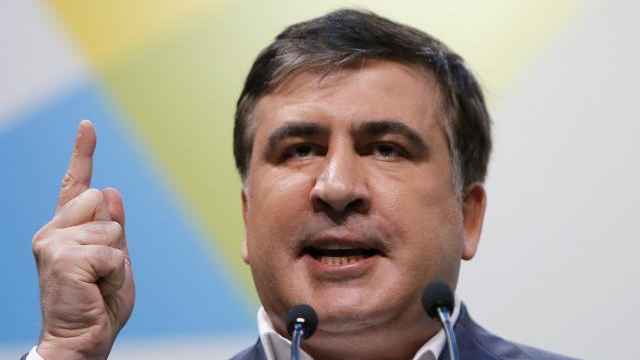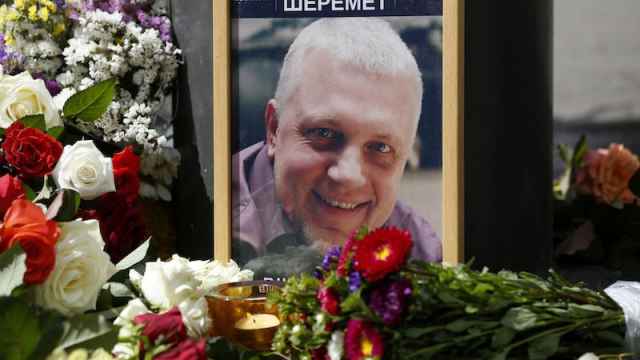A former Russian parliamentarian who fled to Ukraine, then harshly criticized the Russian authorities, has been shot dead in Kiev.
Denis Voronenkov, previously a Communist Party lawmaker in the State Duma, was killed outside Kiev's Premier Palace hotel shortly after 11.00 a.m. March 23. Kiev Police Chief Andrei Krishchenko said the murder was likely a contract killing.
Voronenkov was reportedly leaving the hotel with his bodyguard when he was shot by an unknown assailant. The bodyguard returned fire and wounded the shooter, who later died in hospital. The bodyguard was also wounded in the shootout and remains in critical condition.
Ilya Ponomaryov, another former Russian lawmaker and Kremlin critic living in exile in Kiev, wrote on Facebook that Voronenkov was killed while he was on route to a meeting with him.
A witness to treason?
Even before his murder, Voronenkov’s story shocked Russia. In October, the former lawmaker abruptly immigrated to Ukraine with his wife, opera singer and former United Russia parliamentarian Maria Maksakova.
The move to Ukraine brought an end to Voronenkov’s long and controversial career in Russia. After starting as a federal investigator, Voronenkov was elected to the Duma in 2011. He served until 2016, when he lost both his seat and his parliamentary immunity in legislative elections.
Facing a corruption investigation at home, Voronenkov fled to Kiev with Maksakova in October 2016. Two months later he was granted expedited Ukrainian citizenship as a reward for testifying against former Ukrainian President Viktor Yanukovych.
The former Ukrainian president stands accused of treason for requesting Russian military assistance during the Euromaidan protests in 2014. His trial in absentia is scheduled to begin in the near future.
Voronenkov had already testified before the prosecution before his death, and his deposition will remain an important component of the case. “This evidence will be filed,” Larisa Sargan, a spokesperson for the prosecution confirmed to the Russian website Mediazona.
It is unclear what Voronenkov could have known about Yanukovych’s interactions with Russian authorities during the 2014 protests that led to the former president’s ousting, but his status as a former member of the State Duma’s national security committee makes him the highest ranking Russian official to testify.
“This would make him one of the key witnesses in the trial, which has a clear political dimension for the Ukrainian leadership,” Vladimir Fesenko, a Ukrainian political analyst told The Moscow Times.
Dealing with Ukraine
That political dimension — both for Ukraine and Russia — is clear. In the wake of Voronenkov’s murder, Ukrainian President Petro Poroshenko described the killing as an "act of terrorism” by Russia, displaying the "signature of the Russian special services, as repeatedly seen in different European capitals."
After moving to Ukraine, Voronenkov harshly criticized the Russian authorities publicly. In his interviews, he said that “Yanukovich betrayed his country, was involved in the mass killing of his compatriots, fled to [Russia], and called for this country’s military to destroy his nation.”
In February, Voronenkov told the Ukrainian media outlet Censor, that Russia was in the grip of a "pseudo-patriotic frenzy,” reminiscent of Nazi Germany. He claimed that it was a “mistake” for Russia to annex the Crimean peninsula. In subsequent interviews, described the political climate in Russia as repressive and that senior officials advised him to leave the country after he grew increasingly outspoken.
Voronenkov said that he was going public to guarantee his safety. “I was anticipating a kidnapping,” he said in one interview, “and I wouldn’t be able to prove it was a kidnapping without going public.”
But some found that story less than convincing.
“The scale of anti-Russian sentiment in Voronenkov’s statements is truly surprising — it looks irrational,” a former Russian official, who knew Voronenkov personally, told the Moscow Times two weeks before his death. “It’s raises questions about the deal he made with the Ukrainian authorities,” he said.
No Safe Haven
In his latest interview to Gordonua news, Voronenkov addressed the dangers of his position. “I understand that Russia’s system would like to destroy me,” he said.
But Voronenkov’s murder still shocked Russia. Until recently, he was part of the state elite. As a former investigator, he had connections in the special forces. He was also acquainted with some of Russia’s top bureaucrats. In interviews, he stressed that he paid frequent visits to the Kremlin. Voronenkov’s wife Maksakova was a celebrity and a member of Moscow’s beau monde.
Immediately, many linked Voronenkov’s killing to Russia.
“I have an impression — I hope it’s only an impression — that the practice of killing political opponents has started spreading in Russia,” said Gennady Gudkov, former parliamentarian and ex-security services officer.
In February 2015, Boris Nemtsov, former deputy prime minister and a prominent opposition leader, was shot dead on the Moskvoretsky bridge near the Moscow Kremlin.
In October 2007, investigative journalist Anna Politkovskaya was shot dead on her way home in Moscow. In November 2006, Alexander Litvinenko, a former FSB officer, has been poisoned with radioactive polonium in what British prosecution sees as a revenge act with Russia’s authorities involved.
Russia’s officialdom was more eager to link the murder to Ukrainian authorities. “It’s a cynical and cruel provocation of Ukrainian special forces,” Evgeny Revenko, a former TV presenter and now a parliamentarian, told the Russia-24 television network. “This is what the current leadership in Kiev does: liquidates well-known politicians and reporters.”
Official comments have been more restrained: “It’s not our topic,” the Kremlin’s spokesman Dmitry Peskov said in comments. “We think that any speculations about a Russian trace are absurd,”
Ilya Ponomarev, a former member of the Russian parliament was the first one to flee Russia and testify against Victor Yanukovich before the Ukrainian prosecution earlier this year.
In a recent interview with Dozhd television, Ponomarev was asked if he thought other members of the Russian elite would flee to Ukraine in near future.
“I am positive Voronenkov is not the last one,” Ponomaryov said. “This is an actively developing process. It’s not my guess, I know it.”
But now, after Voronenkov was shot dead in the center of Kiev, this looks much less likely.
A Message from The Moscow Times:
Dear readers,
We are facing unprecedented challenges. Russia's Prosecutor General's Office has designated The Moscow Times as an "undesirable" organization, criminalizing our work and putting our staff at risk of prosecution. This follows our earlier unjust labeling as a "foreign agent."
These actions are direct attempts to silence independent journalism in Russia. The authorities claim our work "discredits the decisions of the Russian leadership." We see things differently: we strive to provide accurate, unbiased reporting on Russia.
We, the journalists of The Moscow Times, refuse to be silenced. But to continue our work, we need your help.
Your support, no matter how small, makes a world of difference. If you can, please support us monthly starting from just $2. It's quick to set up, and every contribution makes a significant impact.
By supporting The Moscow Times, you're defending open, independent journalism in the face of repression. Thank you for standing with us.
Remind me later.



